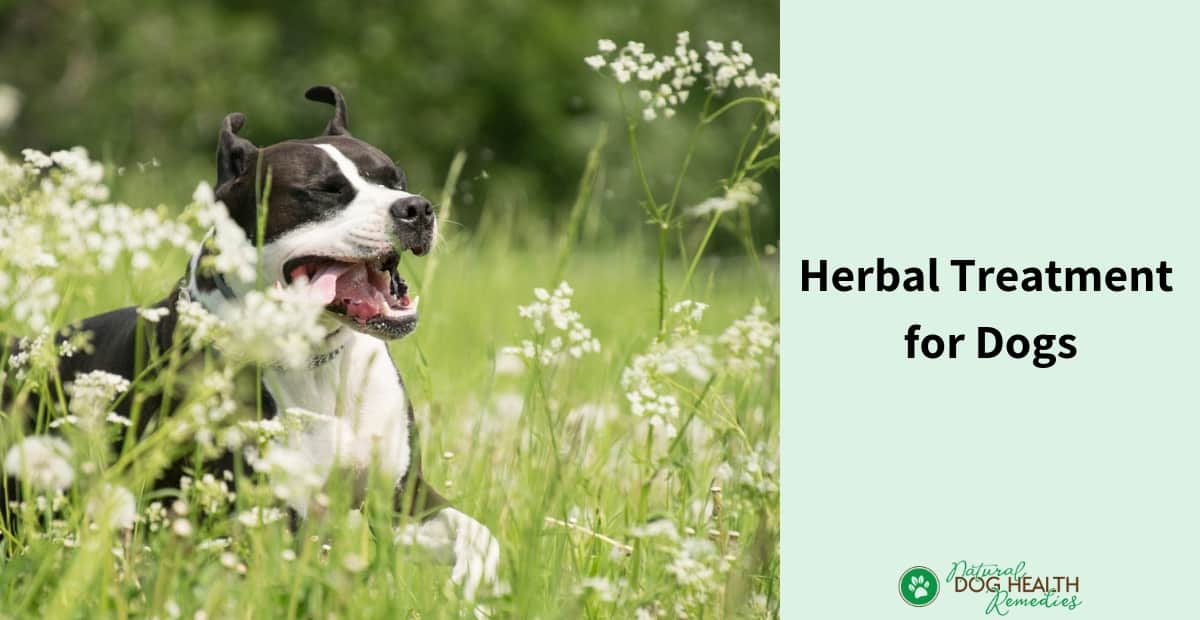Herbal Treatment for Dogs

Overview
Herbal treatment for dogs? Is it just some kind of "new age" stuff?
If you are one of those skeptics who think that herbal treatment, especially for dogs, is just a fad, consider this:
Have you noticed that many dogs these days are plagued by various, sometimes strange, diseases (such as allergies, cancer, aggression and depression) - a lot more often than their predecessors not too long ago?
I have; and in my research on dog health and conventional treatments, I have also noticed that many holistic veterinarians are pointing out, quite rightly, that instead of curing our dogs of diseases, overuse of some conventional medicines (e.g. antibiotics, vaccines) is actually causing an increase in dog chronic diseases.
Don't get me wrong: I am not suggesting that we should totally give up on conventional treatments. In many cases, conventional treatments are effective and can relieve our dogs from a lot of agonies.
However, in some cases, alternative remedies, such as herbal treatment, work better. In other cases, herbal treatment for dogs can be used as a complementary treatment for the overall wellbeing of our fur-babies.
With this in mind, let's look at the following regarding using herbs to treat different dog illnesses:
- Differences between Herbs & Conventional Medicine
- Appropriate Dosages of Herbs for Dogs
- Precautions When Using Herbal Treatment for Dogs
- Some Herbs for Canine Antibiotics (A new page)
- Herbal Pain Remedies for Dogs (A new page)
- Herbs for Cancer in Dogs (A new page)
How is Herbal Treatment Different from Conventional Medicine?
The main difference between herbal treatment for dogs and Western medicine is how diseases and/or symptoms are being viewed.
Doctors and vets who use solely Western medicine usually look at a disease in isolation, and a "cure" is to remove or suppress its symptoms as quickly as possible.
In other words, a "quick-fix" is the norm. Very often antibiotics are prescribed to treat not only bacterial infections, but viral as well. But we all know that frequent use of antibiotics can greatly weaken our pets' immune system, which will lead to more health problems down the road.
On the other hand, herbalists (and other holistic veterinarians) look at our pets as a whole (including body, mind, and "life spirit") when diagnosing the deeper underlying cause or causes of a disease.
Instead of just suppressing the symptoms, herbs are usually used to:
- strengthen the weakened or diseased organ system(s);
- regulate and boost the immune system;
- return out-of-sync body functions to a state of normalcy, resulting in long-lasting health.
A lot of illnesses, including cancer, are as a result of a breakdown of the animal's immune system. Herbal tonics can effectively be used to tone and "tune up" the animal's immune system before they get sick.
Herbs contain numerous chemical constituents which can have medicinal effects on our pets' bodies. When used appropriately, the medicinal properties of specific herbs can regulate and normalize specific activities of one or more organ systems.
Further, when several herbs are used in combination, they can have synergistic effects and have immense long-term benefits on our dog's health.
Specifically, herbs can:
- boost the immune system and generally balance, or "harmonize", the body's organ systems;
- detoxify;
- be nerve-calming;
- relieve pain;
- add nutritious value to our dog's diet.
What are the Appropriate Dosages for Dogs?
There are no precise doses for dogs (and cats).
Many holistic vets suggest starting out slowly, giving the remedy with low doses at first to avoid rejection and the possibility of stomach upset. Then, after a month or so, when the dog adjusts to her herbal intake, you can taper off or add on, depending on her reaction.
Included below is a general guideline for administering herbs to dogs (from the book Dr. Kidd's Guide to Herbal Dog Care by R. Kidd):
| Dog Weight | Sprinkles (put on dog's food once/day) |
Herb Teas | Tablets | Tinctures |
| 1-10 lbs | a small pinch | less than 1/4 cup, 1-3 times/day | 1/2 tablet, 1-3 times/day | 1-3 drops, 2-3 times/day |
| 10-20 lbs | a bigger pinch | about 1/4 cup, 1-3 times/day | 1/2-1 tablet, 1-3 times/day | 3-5 drops, 2-3 times/day |
| 20-50 lbs | 2 pinches-1 teaspoon | 1/4-1/2 cup, 1-3 times/day | 1-2 tablets, 2-3 times/day | 5-10 drops, 2-3 times/day |
| 50-100 lbs | 2 pinches-2 teaspoons | 1/2-1 cup, 1-3 times/day | 1-2 tablets, 3-4 times/day | 10-20 drops, 2-3 times/day |
| Over 100 lbs | up to 1 tablespoon | up to 1 cup, 3 times/day | adult human dose | adult human dose |
 Also, when giving herbs (and other supplements for that matter) to our dogs, it is advisable to give them in a manner that the dog's body is allowed a "break" from the herbs.
Also, when giving herbs (and other supplements for that matter) to our dogs, it is advisable to give them in a manner that the dog's body is allowed a "break" from the herbs.
For example, if you are giving herbs to your dog as a health tonic, use a schedule of five days on and two days off (i.e. give the herbs to the dog for five days and stop giving for 2 days). Do this for 4 weeks, and then have a one-week break.
If, on the other hand, you are giving herbs to your dog to treat a chronic health problem (e.g. arthritis), you don't need to have a full week off after 4 weeks' administration of the herbs.
Instead, you can substitute different products during that period. Many herbs (and supplements as well) have the same or similar properties and functions. By switching from one to another, you can continue to treat the health problem but at the same time you are not overexposing your dog to a particular herb or supplement.

Precautions When Using Herbs on Dogs
- Herbs usually act much more slowly than Western medicines so do not expect any "quick-fix" from herbal treatments. In general, it takes at least 60 to 90 days after the beginning of herbal treatments to see any significant improvement in a pet's health conditions.
- While herbs are, in many ways, better and more gentle to our pets than conventional medicines, don't use herbs in the place of vet consultation, particularly in the event of a serious or life-threatening condition.
In general, herbs are best used to support and improve the general physical wellbeing of our pets. Also, herbs are best used for treating chronic diseases and are not the preferred means of treatment in emergency situations.
- It is important that we obtain the best quality herbs from reputable and trustworthy suppliers.
- While there are lots of safe herbs for use in our pets, there are also some unsafe herbal treatments for dogs and cats (and other small animals).
For more information, be sure to check out our pages on safe herbs for dogs and unsafe herbs for pets.
M.L. Wulff-Tilford and G.L. Tilford, Herbs for Pets (Bowtie Press, 1999).
R. Kidd, Dr. Kidd's Guide to Herbal Dog Care (Storey Publishing, 2000).
M. Goldstein, The Nature of Animal Healing (Ballantine Books, 2000).





